Halifaxgithinji
On this page, you find all documents, package deals, and flashcards offered by seller halifaxgithinji.
- 216
- 0
- 10
Community
- Followers
- Following
2 Reviews received
226 items
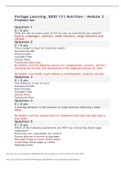
Portage Learning, BIOD 121 Nutrition – Module 2
What are the six major parts of the GI tract as outlined by this module? mouth, esophagus, stomach, small intestine, large intestine and rectum This is added to food for intestinal health: Monosaccharides Disaccharides Insoluble Fiber Soluble Fiber Functional Fiber (ans) Be familiar with the digestive process for carbohydrates, proteins, and fats, including the location and mechanisms of the digestion process for each. Be familiar with health issues related to carbohydrates, proteins, ...
- Package deal
- Exam (elaborations)
- • 5 pages •
What are the six major parts of the GI tract as outlined by this module? mouth, esophagus, stomach, small intestine, large intestine and rectum This is added to food for intestinal health: Monosaccharides Disaccharides Insoluble Fiber Soluble Fiber Functional Fiber (ans) Be familiar with the digestive process for carbohydrates, proteins, and fats, including the location and mechanisms of the digestion process for each. Be familiar with health issues related to carbohydrates, proteins, ...
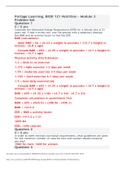
Portage Learning, BIOD 121 Nutrition – Module 3
Calculate the Estimated Energy Requirement (EER) for a female who is 23 years old, 5 feet 4 inches tall, and 130 pounds with a sedentary lifestyle. Use BMR and an activity factor to find the EER. BMR Calculations: Male BMR = 66 + (6.23 x weight in pounds) + (12.7 x height in inches) - (6.8 x age) Female BMR = 655 + (4.35 x weight in pounds) + (4.7 x height in inches) - (4.7 x age) Physical Activity (PA) Estimates 1.2 = little to no exercise 1.375 = light exercise 1-3 days per week 1.55 =...
- Package deal
- Exam (elaborations)
- • 5 pages •
Calculate the Estimated Energy Requirement (EER) for a female who is 23 years old, 5 feet 4 inches tall, and 130 pounds with a sedentary lifestyle. Use BMR and an activity factor to find the EER. BMR Calculations: Male BMR = 66 + (6.23 x weight in pounds) + (12.7 x height in inches) - (6.8 x age) Female BMR = 655 + (4.35 x weight in pounds) + (4.7 x height in inches) - (4.7 x age) Physical Activity (PA) Estimates 1.2 = little to no exercise 1.375 = light exercise 1-3 days per week 1.55 =...
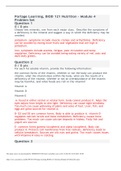
Portage Learning, BIOD 121 Nutrition – Module 4
Choose two minerals, one from each major class. Describe the symptoms of a deficiency in the mineral and suggest a way in which the deficiency may be avoided. potassium- symptoms include muscle cramps and arrhythmias. Deficiency can be avoided by eating more fruits and vegetables that are high in potassium. iron- symptoms include anemia, fatigue, poor circulation and temp regulation. Deficiency can be avoided being eating variety of red ,eats and dark leafy greens. For each fat soluble vi...
- Package deal
- Exam (elaborations)
- • 4 pages •
Choose two minerals, one from each major class. Describe the symptoms of a deficiency in the mineral and suggest a way in which the deficiency may be avoided. potassium- symptoms include muscle cramps and arrhythmias. Deficiency can be avoided by eating more fruits and vegetables that are high in potassium. iron- symptoms include anemia, fatigue, poor circulation and temp regulation. Deficiency can be avoided being eating variety of red ,eats and dark leafy greens. For each fat soluble vi...
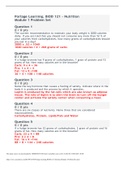
Portage Learning. BIOD 121 – Nutrition Module 1 exam prep
The current recommendation to maintain your body weight is 2000 calories daily. If you are told that you should not consume any more than 52 % of your calories from carbohydrates, how many grams of carbohydrates should you eat in a day? 2000 x .52 = 1040 1040 calories / 4 = 260 grams of carbs If a fudge brownie has 9 grams of carbohydrates, 1 gram of protein and 12 grams of fat. How many calories are in the brownie? Carb: 9 x 4 = 36 Pro: 1 x 4 = 4 Fat: 12 x 9 =108 36 + 4 + 108 = 148 c...
- Package deal
- Exam (elaborations)
- • 6 pages •
The current recommendation to maintain your body weight is 2000 calories daily. If you are told that you should not consume any more than 52 % of your calories from carbohydrates, how many grams of carbohydrates should you eat in a day? 2000 x .52 = 1040 1040 calories / 4 = 260 grams of carbs If a fudge brownie has 9 grams of carbohydrates, 1 gram of protein and 12 grams of fat. How many calories are in the brownie? Carb: 9 x 4 = 36 Pro: 1 x 4 = 4 Fat: 12 x 9 =108 36 + 4 + 108 = 148 c...
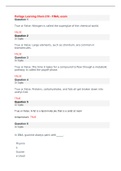
chem 210 final exam prep
True or False: Nitrogen is called the superglue of the chemical world. FALSE True or False: Large elements, such as strontium, are common in biomolecules. FALSE True or False: The time it takes for a compound to flow through a metabolic pathway is called the payoff phase. FALSE True or False: Proteins, carbohydrates, and fats all get broken down into acetyl-CoA. TRUE True or False: A fat is a lipid molecule that is a solid at room temperature. TRUE In DNA, guanine...
- Package deal
- Exam (elaborations)
- • 18 pages •
True or False: Nitrogen is called the superglue of the chemical world. FALSE True or False: Large elements, such as strontium, are common in biomolecules. FALSE True or False: The time it takes for a compound to flow through a metabolic pathway is called the payoff phase. FALSE True or False: Proteins, carbohydrates, and fats all get broken down into acetyl-CoA. TRUE True or False: A fat is a lipid molecule that is a solid at room temperature. TRUE In DNA, guanine...
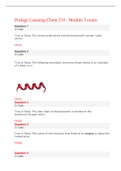
Portage Learning Chem 210 - Module 3
Portage Learning Chem 210 - Module 3 exam True or False: The amino acids serine and threonine both contain sulfur atoms. FALSE True or False: The following secondary structure shown below is an example of a beta- turn. FALSE True or False. The side chain of phenylalanine is bonded to the backbone nitrogen atom. FALSE True or False: The name of the molecule that binds to an enzyme is called the holoenzyme. FALSE True or False: An inhibitor ...
- Package deal
- Exam (elaborations)
- • 16 pages •
Portage Learning Chem 210 - Module 3 exam True or False: The amino acids serine and threonine both contain sulfur atoms. FALSE True or False: The following secondary structure shown below is an example of a beta- turn. FALSE True or False. The side chain of phenylalanine is bonded to the backbone nitrogen atom. FALSE True or False: The name of the molecule that binds to an enzyme is called the holoenzyme. FALSE True or False: An inhibitor ...
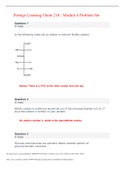
Portage Learning Chem 210 - Module 4 Problem Set
Portage Learning Chem 210 - Module 4 Problem Set Is the following molecule an aldose or ketose? Briefly explain. ketose. There is a C=O on the third carbon from the top. Which carbon in erythrose would tell you if the monosaccharide is D or L? Give the carbon’s number in your answer. On carbon number 3, which is the penultimate carbon. Glucose and mannose are epimers. Name another epimer of glucose besides mannose. Galactose. ...
- Package deal
- Exam (elaborations)
- • 7 pages •
Portage Learning Chem 210 - Module 4 Problem Set Is the following molecule an aldose or ketose? Briefly explain. ketose. There is a C=O on the third carbon from the top. Which carbon in erythrose would tell you if the monosaccharide is D or L? Give the carbon’s number in your answer. On carbon number 3, which is the penultimate carbon. Glucose and mannose are epimers. Name another epimer of glucose besides mannose. Galactose. ...
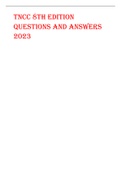
TNCC 8th Edition Questions And Answers 2023
TNCC 8th Edition Questions And Answers 2023 What are the greatest risks for transport? - Answer - Loss of airway patency, displaced obstructive tubes lines or catheters, dislodge splinting devices, need to replace or reinforce dressings, deterioration in patient status change in vital signs or level of consciousness, injury to the patient and/or team members According to newtons law which of these two force is greater: size or force? - Answer - Neither. For each force there is an equal a...
- Exam (elaborations)
- • 6 pages •
TNCC 8th Edition Questions And Answers 2023 What are the greatest risks for transport? - Answer - Loss of airway patency, displaced obstructive tubes lines or catheters, dislodge splinting devices, need to replace or reinforce dressings, deterioration in patient status change in vital signs or level of consciousness, injury to the patient and/or team members According to newtons law which of these two force is greater: size or force? - Answer - Neither. For each force there is an equal a...
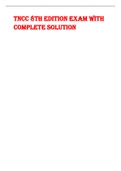
TNCC exam with complete solution
TNCC 8th edition exam with complete solution The major cause of preventable death after injury correct answer Uncontrolled hemorrhage The best measure of the adequacy of cellular perfusion and helps to predict the outcome of resuscitation correct answer Base deficit Examples of primary blast injuries correct answer Blast lung, ruptured tympanic membrane, TBI, abdominal hemorrhage Examples of secondary blast injuries correct answer Wounds from debris and bomb fragments Examples of tertiar...
- Exam (elaborations)
- • 6 pages •
TNCC 8th edition exam with complete solution The major cause of preventable death after injury correct answer Uncontrolled hemorrhage The best measure of the adequacy of cellular perfusion and helps to predict the outcome of resuscitation correct answer Base deficit Examples of primary blast injuries correct answer Blast lung, ruptured tympanic membrane, TBI, abdominal hemorrhage Examples of secondary blast injuries correct answer Wounds from debris and bomb fragments Examples of tertiar...

TNCC final exam test 2023 . Questions and Answers.
TNCC final exam test 2023 open book Why is a measure of serum lactate obtained in the initial assessment of the trauma patient? Answer: c - Answer - a) to measure oxygenation and ventilation b) to quantify the base deficit for the adequacy of cellular perfusion c) *to gauge end-organ perfusion and tissue hypoxia ** d) to determine the underlying cause of shock A trauma patient is restless and repeatedly asking "where am I?" vital signs upon arrival were BP 100/60 mm Hg, HR 96 beats/mi...
- Exam (elaborations)
- • 12 pages •
TNCC final exam test 2023 open book Why is a measure of serum lactate obtained in the initial assessment of the trauma patient? Answer: c - Answer - a) to measure oxygenation and ventilation b) to quantify the base deficit for the adequacy of cellular perfusion c) *to gauge end-organ perfusion and tissue hypoxia ** d) to determine the underlying cause of shock A trauma patient is restless and repeatedly asking "where am I?" vital signs upon arrival were BP 100/60 mm Hg, HR 96 beats/mi...

ATI PHARMACOLOGY PROCTORED TEST BANK LATEST VERSION 2023
ATLS MCQ-QUESTIONS&ANSWERS BEST FOR 2023.pdf